PlayStation’s just lost a landmark court case that could set some precedent for cheating software in the EU—which is probably better for the consumer than it sounds at first blush.
As reported by EuroNews, PlayStation has recently been embroiled in a legal bout with Datel, who have been selling software that allows players to cheat at videogames. The software in question gave players infinite boosts in MotorStorm, but it also—in a less cheaty fashion—allowed them to control it using motion controls, which seems pretty benign to me.
The case made it to the highest court in the EU, the Court of Justice, and has been thoroughly dismissed in Datel’s favour. Despite Sony’s argument that the software “latches on … like a parasite” to the console, the judges maintain that the software involved merely impacts its RAM rather than the program itself, so it’s all fair play:
“The Directive on the legal protection of computer programs does not allow the holder of that protection to prohibit the marketing by a third party of software which merely changes variables transferred temporarily … The directive protects only the intellectual creation as it is reflected in the text of the computer program’s source code and object code.”
In other words, the EU is completely fine with selling cheats, mods, and other software that only impact a game’s data in RAM—whether that’s on a computer or not.
In an opinion presented to the court back in April, Advocate General Maciej Szpunar also added: “The author of a detective novel cannot prevent the reader from skipping to the end of the novel to find out who the killer is, even if that would spoil the pleasure of reading and ruin the author’s efforts to maintain suspense.”
It should be noted that, naturally, this doesn’t stop Sony from banning players who violate their terms of service agreements—the EU isn’t giving you carte blanche to spawn infinite samples in Helldivers 2, or anything—merely, it’s simply not against the law to sell these things for use. The person buying them gets to make the judgement call on whether they’re likely to get their accounts in trouble or not.
Honestly, there are a lot of reasons to cheer for this if you’re into mods, or think that you should have control over the software and hardware you buy. While that detective novel comparison is pretty messy—games are obviously more complicated than that—I agree with the overall sentiment, and Sony’s characterisation of these tools as parasites is far more wack by most metrics.
Cheating in multiplayer games sucks, obviously, but when it comes to single-player games, who rightly cares? Should Sony be able to legally punish someone for modifying a piece of hardware they own, or selling tools to do that? I don’t really think so. That’s not to mention that software like this also includes accessibility aids that disabled people use to play their videogames. These gamers use software that could (uncharitably) be considered cheats all the time.
Not to mention, accessibility options are growing more and more popular in mainstream gaming anyway, like high-contrast visuals, sound cues, and toggles that just straight-up stop you from dying. Even if some studios still haven’t figured out the whole colour-blind thing yet (I’m not still mad, Larian, I pinky promise), I don’t think any company should get a say in whether people do it themselves, as long as they’re being reasonable and not ruining online modes for others. Let ’em play.












